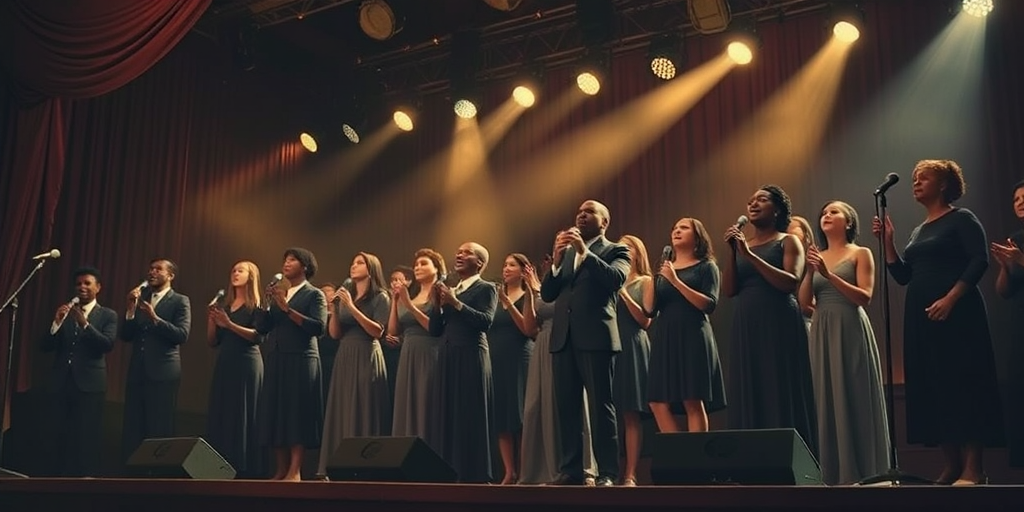Have you ever wondered how a few daring voices transformed history with their powerful message of hope? We’re diving into the heart of gospel innovation where pioneering quartets and groundbreaking radio and television moments reshaped music and faith. Through vivid storytelling and unforgettable milestones, we explore how these seven remarkable groups defied the norm and left an indelible mark on history. Together, we’ll uncover a legacy built on resilience, passion, and community—that continues to inspire countless believers and echo through every uplifting hymn.
Evolution of Gospel: From Radio Waves to Television Triumphs
Radio broadcasting played a pivotal role in popularizing gospel music by reaching congregations far beyond traditional church boundaries. Live 50,000-watt stations transmitted the dynamic voices and harmonies of gospel quartets, allowing groups to connect with audiences on a national scale. Pioneers like the Blackwood Brothers capitalized on this newfound accessibility, demonstrating that technology could amplify sacred sound and transform spiritual outreach. This era of live broadcasts laid the groundwork for a modern appreciation of religious soundscapes, uniting disparate communities through the power of music.
Television later emerged as a transformative force that redefined touring and performance dynamics. The historic television talent search win in 1954 marked a turning point, propelling gospel groups into the national spotlight and fostering a renewed spirit of innovation. Modern travel solutions, such as custom-built touring buses and private airplanes, further enhanced logistical efficiency, enabling groups to expand their reach.
- Live radio broadcasts
- Television talent victories
- Adoption of touring buses
- Introduction of private airplanes
These technological milestones not only reshaped how gospel music was delivered but also enriched its legacy as a cornerstone of faith and communal inspiration.
Trailblazers in Faith: Iconic Gospel Ensembles and Their Impact

The evolution of gospel music is marked by a dynamic timeline of innovation that began with the early adoption of radio broadcasts and shape note systems. These foundational moments allowed sacred sound to reach congregations and communities far beyond traditional church walls. Early quartets embraced revolutionary techniques that simplified musical notation and laid the groundwork for a genre that would steadily grow in influence and accessibility.
Television soon emerged as a transformative medium, fundamentally altering the landscape of gospel music. Landmark televised events and nationwide talent searches, such as the Blackwood Brothers’ 1954 win, amplified the impact of live performances and connected urban audiences with powerful, soul-stirring melodies. Influential live events like Wally Fowler’s all-night sings became communal experiences that solidified the legacy of these groups, turning their performances into cultural touchstones.
These groups navigated a series of pivotal milestones and challenges that defined their enduring impact:
- First radio broadcast innovations
- Breakthrough television wins
- Nationwide touring with custom travel methods
- High-volume songbook sales and publishing successes
- Resilient responses to tragic events
- Impactful live events like the “all-night sings”
Their journey is encapsulated by both achievement and adversity, reflecting the resilience and transformative power of gospel music.
Today, the legacy of these trailblazers continues to inspire cultural and spiritual renewal, shaping modern worship practices across generations. Their contributions remain a beacon of hope and unity, reminding us that the blend of technological breakthroughs and unwavering faith can transform lives.
| Year | Event | Impact |
| 1921 | Formation of early quartets | Laid foundation for gospel traditions |
| 1954 | Televised talent search win by Blackwood Brothers | Expanded national audience |
| 1964 | Launch of gospel TV shows | Modernized gospel performance and outreach |
Final Words
In the action, we have witnessed early innovations, transformative live broadcasts, and the bold rise of influential quartets.
We explored technological milestones and courageous moments that propelled gospel music into national spotlight.
The journey outlined has revealed how resilience, creative breakthroughs, and community spirit have kept faith alive through every note played.
Legendary Gospel Groups That Changed History continue to inspire and unite us.
Their enduring legacy reminds us to celebrate every moment, innovate boldly, and embrace the uplifting power of gospel music.
FAQ
Who is considered the greatest gospel singer of all time?
A: Mahalia Jackson is widely recognized as the greatest gospel singer of all time. Her powerful contralto voice and emotional depth revolutionized gospel music from the 1920s through the 1960s.
What are some legendary male gospel groups that changed history?
A: The Blackwood Brothers, The Dixie Hummingbirds, and The Soul Stirrers fundamentally shaped gospel music. These groups pioneered professional touring, radio broadcasts, and recording techniques in the 1940s and 1950s.
What was the first gospel group in America?
A: The Spear family formed the first professional gospel group in 1921. They established the foundation for modern gospel quartets and introduced innovative touring and performance practices.
What technological advances helped spread gospel music?
A: Radio broadcasts with 50,000-watt stations, television appearances, and custom touring buses transformed gospel music’s reach. The Blackwood Brothers’ 1954 TV talent show victory marked a pivotal moment.
How did early gospel groups innovate their music?
A: Early gospel innovators introduced shape note systems in the 1870s, simplified seven-note reading methods, and established music schools. Publishing companies like Vaughn and Stamps Baxter revolutionized distribution.
What is the best-selling gospel group of all time?
A: The Blackwood Brothers hold the record for best-selling gospel group. Their groundbreaking television appearances, extensive touring, and numerous recordings established unprecedented commercial success.
How did gospel groups influence modern worship?
A: Gospel quartets merged traditional sounds with modern innovations, introduced professional performance standards, and established the “all-night sings” format that connected urban communities through music.
